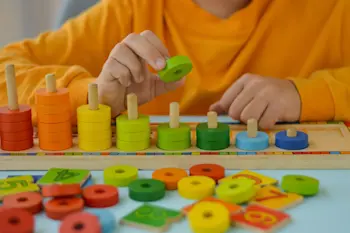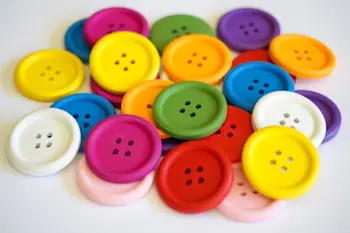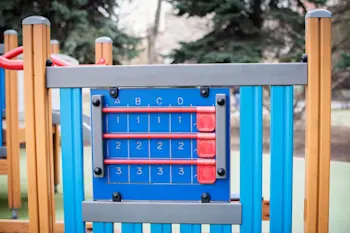How to support your 4 year old to develop number sense

When your child starts school, there are so many skills that teachers are building and introducing during the reception year. In this blog we are looking at how to support early learning by building the foundations of maths. We’ll look at how teachers support your child to develop number sense in school and what you can do at home to help.
What is number sense?
Number sense is about understanding how the number system works, how numbers relate to each other and how to play with them.
Number sense involves:
Understanding quantities
Grasping concepts like more and less, and larger and smaller
Understanding the order of numbers in a list: 1st, 2nd, 3rd, etc.
Understanding symbols that represent quantities (4 means the same thing as four objects)
Making number comparisons (4 is greater than 3)
Recognising relationships between single items and groups of items (five means one group of five items)
Why is number sense important?
When it comes to understanding numbers, everyone is different. Some children will develop number sense quickly whilst others find it difficult. Children who struggle with number sense will find maths very difficult – concepts like addition and multiplication won’t make sense. But it extends beyond struggling with a subject at school because everyday tasks and skills in life, like judging time, measuring and handling money, will also be really difficult. The good news is with time and practise these skills can improve and starting early can make all the difference!
How is number sense developed at school?
In the early years foundation stage (EYFS) classroom, children are given lots of opportunities to explore and play with numbers. Activities range from sorting buttons to estimating the number of ping-pong balls in a jar. Teachers regularly talk about how many children are in school and how many are absent. They help children to visualise this with interactive whiteboards or pictures of students on a pin board in two columns. Voting is also common from counting the number of hands raised in the air or slips of paper in a pot. These daily activities really build number confidence.
How to develop number sense at home
It doesn’t all have to happen at school though. There are so many wonderful ways you can engage with numbers in and around your home. Rule number one – developing number sense should be active and fun! Children need to handle objects to really grasp number concepts. Below you’ll find three fun maths games that don’t require any special resources. Include them in your next playtime together and enjoy developing number sense with your child.
3 fun maths games for four-year-olds
Rainbow treasure hunt

Ask your child to find objects around the house:
Something that is red
Something that is yellow
Something that is orange
Something that is green
Something that is blue
Something that is purple
Something that is pink
Do one colour at a time and bring all the objects back to the same place.
Using the colours of the rainbow is a great way of developing their knowledge of colour but also means they will hopefully find lots of different types of objects around the house.
When your child finds all the objects, put them in a pile and look at them together.
Which items are bigger, which are smaller? Can they order them from smallest to biggest?
Can they guess how many items they found? Encourage them to have a go at estimating the number. Then count them together.
Is it more or less than they thought?
If they put the red, yellow and orange items together in a group how many do they have? How many are left over? Which group has more?
Help your child to see that one group can have more even if the items are smaller.
Through these gentle questions you have encouraged your child to build a sense of number.
Number walks

Out and about? Why not go on a number walk. You’re trying to spot as many numbers as you can. They may be on houses, road signs, buses, car number plates, adverts or in the playground. You could just say them out loud together or how about taking a clipboard and a pencil and writing down the numbers that you see? You can take it in turns and your child can try and copy the numbers as you write them out.
Which numbers are bigger? Have you found numbers that are in counting order? House numbers might go up in twos – you can introduce the concept of odd and even.
Can they guess which number might come next?
I bet you’ll have all sorts of number related conversations. Some concepts might be too tricky for your child to grasp just yet but that’s okay, at this stage it’s about allowing your child space and time to absorb all these different ideas and giving the brain time to figure out how things are related.
Fruit bowl challenge

This is an activity that helps develop your child’s concept of size v quantity. You can use the fruit in your fridge at home or while out shopping.
Ask your child to order the fruit by size and count them. Getting children to count objects of different sizes helps them to realise that size does not affect the quantity. For example 3 apples are a smaller quantity than 10 grapes even though they can hold the grapes in their hands.
Try asking these questions:
Which is the biggest fruit and which is the smallest?
Are there more grapes than there are apples?
If you eat one of the grapes, how many will be left now?
If you have a satsuma or orange – peel the fruit and break into segments. Count how many segments inside the fruit. Then talk about how many segments there will be if you have 2 or more satsumas. This is the foundation of the concept of multiplication.
Want to learn more?
If your 4 year old is keen to explore numbers or seems a little reluctant, our friendly English and maths tutors at Explore Learning are here to offer a helping hand. We build maths and English confidence through activities tailored to your child’s unique ability, working at their pace, introducing concepts when they are ready. Why not visit one of our vibrant learning centres and pop in for a free session today.
Cancel anytime
No joining fee
In centre or online
Memberships to suit you
Cancel anytime
No joining fee
In centre or online
Memberships to suit you
Cancel anytime
No joining fee
In centre or online
Memberships to suit you




